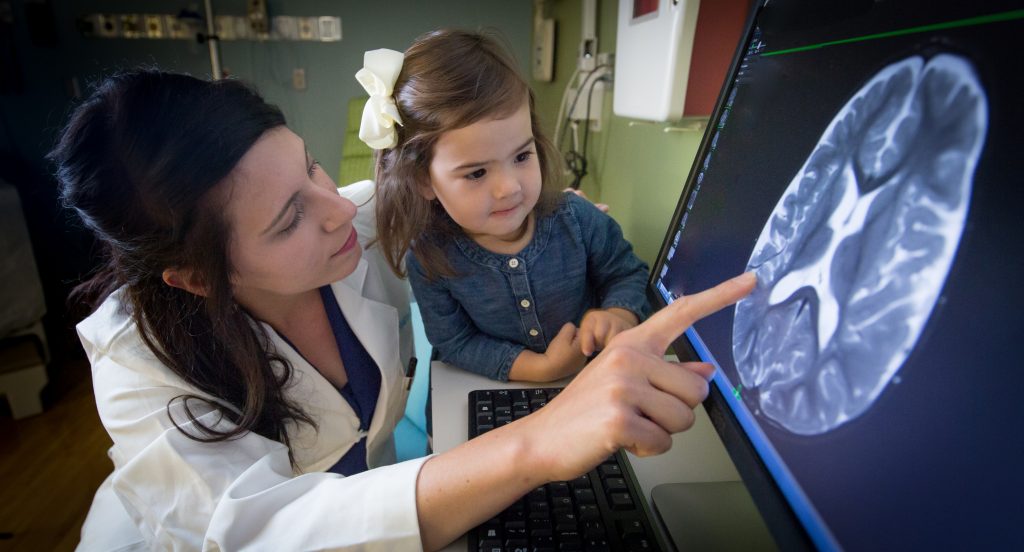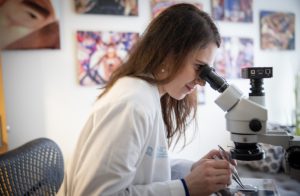 Dr. Carolyn Quinsey is a pediatric neurosurgeon and adult neurosurgeon at UNC Health. She thrives in her role as an educator as both the Associate Neurosurgery Residency Program Director, and as a mentor to medical students and aspiring neurosurgeons. She is also interested in global neurosurgery and, prior to the Covid-19 pandemic, traveled to Africa regularly to help develop a program to train neurosurgeons in Malawi.
Dr. Carolyn Quinsey is a pediatric neurosurgeon and adult neurosurgeon at UNC Health. She thrives in her role as an educator as both the Associate Neurosurgery Residency Program Director, and as a mentor to medical students and aspiring neurosurgeons. She is also interested in global neurosurgery and, prior to the Covid-19 pandemic, traveled to Africa regularly to help develop a program to train neurosurgeons in Malawi.
As part of our series highlighting our female neurosurgeons during Women’s History Month, Dr. Quinsey agreed to answer a few questions on being a woman in neurosurgery, and on encouraging other women to pursue challenging medical careers.
At what age did you decide you wanted to go into medicine?
Sometime in high school. There was a program through the school where they linked students to a community mentor. When I filled out the form I put surgeon as the desired mentor without necessarily being committed to medicine. After I spent time in the clinic and OR with the orthopedic surgeon I was paired to, I knew I needed to be a surgeon.
“I heard countless times that I was choosing a more difficult and demanding life and limiting my free time and ability to have and raise a family. Fortunately, I knew intuitively that being happy in my professional life would be a huge part of how I show up as the person I want to be in my personal life.”
What obstacles did you encounter pursuing a career in medicine?
I’m a first generation college student, so one of the biggest obstacles in any part of my education was learning the process, requirements, and expectations for every application phase. Finding the right mentors and cheerleaders was key to overcoming this.
 The other obstacle I encountered was well meaning discouragement from friends and family to pursue medicine, and then even more so, a surgical subspecialty. I heard countless times that I was choosing a more difficult and demanding life and limiting my free time and ability to have and raise a family. Fortunately, I knew intuitively that being happy in my professional life would be a huge part of how I show up as the person I want to be in my personal life.
The other obstacle I encountered was well meaning discouragement from friends and family to pursue medicine, and then even more so, a surgical subspecialty. I heard countless times that I was choosing a more difficult and demanding life and limiting my free time and ability to have and raise a family. Fortunately, I knew intuitively that being happy in my professional life would be a huge part of how I show up as the person I want to be in my personal life.
If you could give your undergrad self one piece of advice, what would it be?
Being an interesting person isn’t something you can put on your applications, but it is a huge part of being someone people desire to admit to medical schools, residencies, and faculty. Invest in your hobbies and interests as much as academic pursuits.
“A program that really values diversity and values women in this specialty is far more likely to have women in leadership, or promoted or supported in other ways.”
What would you say to other women who are looking to pursue a career in neurosurgery?
Find a residency that celebrates diversity. I find that students are often focused on how many current residents are female in a residency. The statistical layout of number of diverse residents or faculty is less important than the culture of inclusion.
of number of diverse residents or faculty is less important than the culture of inclusion.
Far more telling about the culture of inclusion is how supported are the female faculty? Are they being promoted, do they have resources, and how long are they staying on faculty? A program that really values diversity and values women in this specialty is far more likely to have women in leadership, or promoted or supported in other ways. How people interact with their peers is more telling that how they treat trainees.
Written by Makenzie Hardy, Marketing Coordinator, UNC Health Department of Neurosurgery